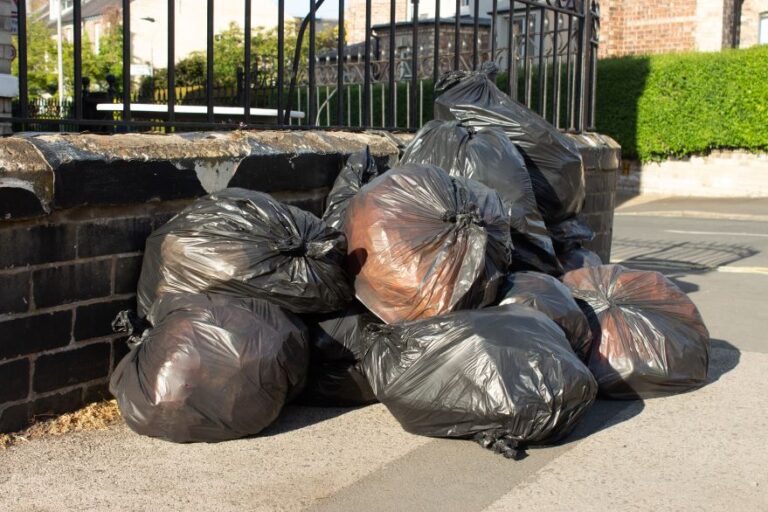Picture this: overflowing bins, black bags lining the pavements, the local wildlife making themselves right at home in your waste. It sounds like something from a horror movie, but for millions across the UK, it could soon be a reality.
More than 40 councils are looking into reducing bin collections, with some areas potentially seeing their black bins emptied just once a month. Yes, you read that right – four weeks’ worth of rubbish left festering at your doorstep. That really is rubbish news!
Is my bin collection being reduced?
Bristol City Council sparked outrage last week when it proposed slashing general waste collections to once every four weeks. And they’re not alone. Carmarthenshire and East Ayrshire are considering the same cut, while four more councils – North Ayrshire, Dundee, Angus, and East Ayrshire – are looking at monthly recycling collections.
Overall, around one in ten councils across the UK are considering reducing how often they collect waste. The impact? More than eight million people could see their bin schedules disrupted, with five million facing fewer black bin collections and over 800,000 experiencing a downgrade to their recycling service.
Some councils, like East Hertfordshire, are even contemplating shrinking the size of residents’ bins from 240 litres to just 180 – a double blow to those already struggling with waste management.

So, is your local council on the list of those planning cuts? Here’s a breakdown:
Three-weekly residual waste collections planned:
Babergh, Caerphilly, Cheshire East, Dundee, East Dunbartonshire, East Hertfordshire, East Suffolk, Flintshire, Mid Sussex, North Hertfordshire, North Somerset, North Warwickshire, and Teignbridge.
Weekly recycling reduced to fortnightly:
Lewisham, New Forest, Oadby and Wigston, and Sandwell.
Three-weekly recycling reduced to four-weekly:
North Ayrshire and Dundee.
Fortnightly recycling reduced to three-weekly:
North Hertfordshire.
Weekly residual waste reduced to fortnightly:
Allerdale, Arun, Basingstoke & Deane, Birmingham, New Forest, Oadby and Wigston, and Sandwell.
Three-weekly residual waste reduced to four-weekly:
East Ayrshire and Carmarthenshire.
Ten more councils say there are planning changes but their proposals have not been released yet.
Joanna Marchong from the TaxPayers’ Alliance, the organisation behind these findings, didn’t hold back on her criticism: “Residents will be left wondering what to do when the bin lorries don’t show up and the rubbish piles high.
“A shocking number of councils are considering cutting collections, which would leave people facing ever-growing mountains of waste. Town halls need to stop making a mess of basic services and focus on delivering what taxpayers pay for.”
Council tax going up, services going down
If this news wasn’t frustrating enough, many of us are already dealing with eye-watering council tax hikes. And for some, the increases are even higher than usual.
Typically, councils with social care responsibilities can raise council tax by up to 4.99% a year without asking for permission, while others are capped at 2.99%. But six councils have been granted special exemptions to hike their rates above 5% without a local referendum.
- Bradford Council: 10% increase
- Newham & Windsor and Maidenhead: 9% increase
- Birmingham, Somerset & Trafford: 7.5% increase
Meanwhile, councils like Hampshire were denied requests for even steeper hikes – in this case, 15%. In total, councils in England will have an estimated £69bn to spend next year – an increase of 6.8% compared to this year, assuming they all max out their tax increases.
But despite this cash injection, many local authorities are still warning of financial struggles. One in four councils told the Local Government Association that they may need emergency funding to avoid bankruptcy in the near future.
So, higher taxes, fewer services, and potentially months of staring at an overflowing bin – what exactly are we paying for? It’s a question more and more taxpayers are starting to ask.
Planning ahead – for waste and what matters
With council cuts affecting essential services like bin collections, it’s a reminder that planning ahead is key—whether for waste management or protecting what matters most. While we can’t promise to take out the rubbish for you, we can help protect your home, business, and livelihood with the right insurance cover!
Why not pop into your nearest Howden branch, whether for a coffee, to see what’s on or to ask your insurance questions. They’ll be more than happy to chat!
Sources: Tax Payer’s Alliance, This Is Money, LBC News, Daily Mail, BBC News.
You could also read:
- Is buying a caravan worth the cost?
- The older driver’s handbook
- Is your home in a new flood hotspot?
- Dashcams and driver scores – do they reduce your premium?
- Should pavement parking be banned?
This is a marketing blog by Howden Insurance.

